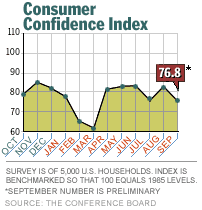NEW YORK (CNN/Money) -
Consumer confidence fell in September to the lowest level since the war in Iraq, weighed down by nagging worries about the weak job market, a research group said Tuesday.
The Conference Board, a business research group based in New York, said its closely watched index of consumer confidence fell to 76.8 from a revised 81.7 in August. That was much worse than economists' forecasts and the lowest reading since March, when consumers were worried about the U.S.-led campaign to take Baghdad.

In addition, the Conference Board's "expectations" index, which measures how consumers feel about the future, fell to 88.4 from a revised 94.9 in August. The "present situation" index dropped to 59.5 from a revised 62.
"The lack of improvement in labor market conditions continues to dampen consumers' spirits," said Lynn Franco, director of the Conference Board's Consumer Research Center. "Despite September's retreat, consumers remain cautiously optimistic about the outlook for the next six months. Consumer spending is likely to continue at or near current levels."
Separately, Chicago-area purchasing managers said their closely watched index of regional manufacturing activity dropped to 51.2 in September from 58.9 in August.
U.S. stock prices fell sharply after the reports while Treasury bond prices rose.
| Related stories
|

|
|
|
|
Consumer confidence is watched closely, since consumer spending makes up more than two-thirds of the total economy. Despite a recession, terror attacks, two wars, a bear market in stocks, corporate accounting scandals and more, consumers have continued to spend in recent years, helped along by super-low interest rates.
But their attitude about the economy has been shaky, as the labor market has been mired in its longest slump since World War II. Recent sentiment surveys by the University of Michigan and ABC/Money have echoed the weakness in Thursday's Conference Board report.
Though the latest recession ended in November 2001, according to the National Bureau of Economic Research, non-farm payrolls still are 2.8 million jobs lighter than they were when the recession began in March 2001, according to Labor Department data. Nearly two million people have been unemployed for 27 weeks or more.
In the Conference Board survey, the percentage of people expecting job-market improvement in the next six months fell to 16.7 percent from 18.0 percent in August. The percentage reporting jobs are "hard to get" rose to 35.3 percent from 34.1 percent.
Weakness in the labor market has kept wage and salary growth stagnant in recent years, but it has been growing -- one reason, perhaps, why consumer confidence and spending haven't completely fallen off the table, according to Conference Board economist Ken Goldstein.
"Given what we've known about the labor market, it's a surprise in some sense that confidence is holding up as much as it is," Goldstein said. "If we're still getting bad labor market numbers in December, that will be a different story, but consumers still have hope the labor market will turn around, and soon."
The Federal Reserve, however, might not be so sanguine. It's cut short-term interest rates 13 times since 2001 to keep consumers in the game, and some of its policy makers have hinted another cut is not out of the question.
As amazing as it may seem, given the level of optimism expressed by most mainstream economists -- and some Fed economists -- about the economy's future, the reports on consumer confidence and Chicago PMI, along with the expectation that Friday will bring another ugly report on unemployment from the Labor Department, helped fuel some muttering Tuesday morning that another cut was suddenly within the realm of possibility.
"While we would not get too excited, these data are just the right stuff to further trends already under way in financial markets," said Sherry Cooper, chief economist at BMO Nesbitt Burns. "Whispers about Fed easing are sure to follow."

|

